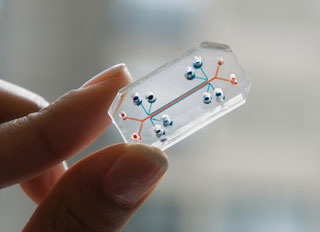 Emulate Inc. announced the company’s launch with a $12 million Series A financing to commercialize a first-in-kind, automated ‘Organs-on-Chips’ platform that mimics human physiology and diseases, while permitting real-time elucidation of molecular mechanisms of action and toxicity. Emulate’s proprietary Organs-on-Chips platform achieves a new industry standard by predicting human responses to medicines, chemicals, and toxins more rapidly and with greater fidelity than animal models. The company’s mission is to commercialize its Organs-on-Chips bioemulation products, automated platform and software to enhance innovation and accelerate the development of pharmaceutical, chemical, cosmetic, and personalized medicine products.
Emulate Inc. announced the company’s launch with a $12 million Series A financing to commercialize a first-in-kind, automated ‘Organs-on-Chips’ platform that mimics human physiology and diseases, while permitting real-time elucidation of molecular mechanisms of action and toxicity. Emulate’s proprietary Organs-on-Chips platform achieves a new industry standard by predicting human responses to medicines, chemicals, and toxins more rapidly and with greater fidelity than animal models. The company’s mission is to commercialize its Organs-on-Chips bioemulation products, automated platform and software to enhance innovation and accelerate the development of pharmaceutical, chemical, cosmetic, and personalized medicine products.“Emulate’s Organs-on-Chips platform provides, for the first time, a window into the inner-workings of human organs without having to invade a living body,” said James Coon, chief executive officer of Emulate. “Our unique automated Organs-on-Chips approach to human bioemulation opens up entirely new possibilities to develop products with enhanced properties, improved efficacy and safety, and personalization to patients and consumers. The company will focus on key strengths of integrating design, biology and engineering to create revolutionary products. We are launching Emulate to be a leader in advancing innovative product design across multiple industries including drug development, healthcare, agriculture and consumer health.”
Emulate will use the proceeds from the financing to advance the first commercial applications of its automated Organs-on-Chips platform through co-innovation with corporate and clinical clients, and through internal development programs. The company’s initial focus will be use of Organs-on-Chips to provide more rapid and accurate evaluation of human responses to drugs and cosmetics, and to create new clinical guidance tools for personalized therapies. The Series A financing was led by the venture capital firm NanoDimension, alongside of investment by Cedars-Sinai Medical Center and private investor Hansjörg Wyss.
“Emulate’s platform has significant potential to advance human health today, not only to better design and evaluate new breakthrough medicines, but also to drive more personalized diagnosis and treatment approaches,” said Shlomo Melmed, senior vice president for Academic Affairs and dean of the Medical Faculty at Cedars-Sinai. “Our vision is we can one day put each patient’s cells on chips that mimic the function of organs, and this will open up new ways for us to design truly personalized treatment with stem cells, based on each patient’s unique genetic profile on their own individualized Organs-on-Chips.”
Emulate’s technology represent a unique human bioemulation platform that permits analysis of molecular functions within human cells living in an engineered microenvironment that accurately recapitulates human organ biology. Human Organs-on-Chips are miniaturized devices created with microchip manufacturing that contain tiny hollow channels lined by living human cells and tissues cultured under continuous fluid flow and mechanical forcing regimens, such as cyclic breathing and peristalsis, which effectively recapitulate organ-level physiology and disease responses. In Emulate’s automated platform, different Organs-on-Chips, such as lung, liver, intestine, kidney, skin, eye, and blood-brain-barrier, can be linked together by flowing liquid containing living human immune cells that simulates blood to form a “Human-Body-on-Chips” to more closely replicate whole body-level responses.
Date: July 28, 2014
Source: Emulate
Filed Under: Drug Discovery




